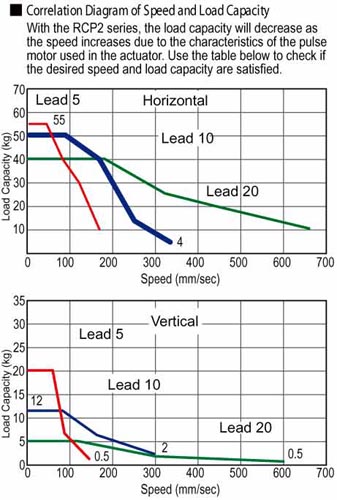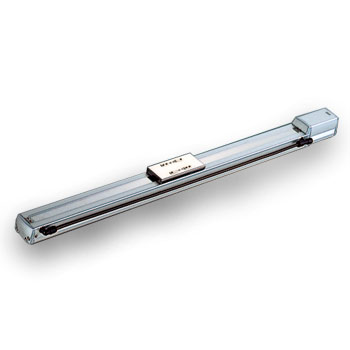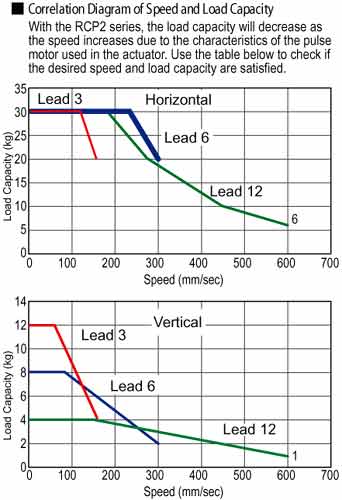
RCP2CR-SS7C / SS8C Cleanroom Slider Type
Steel Base Electric Actuator
 
|
||||||||||||||||||||||||||||||||||||||||||||||||||||||||||||||||
|
|
||||||||||||||||||||||||||||||||||||||||||||||||||||||||||||||||
RCP2CR-SS7C Lead and Load Capacity
[1] = Stroke, [2] = Cable Length, [3] = Options RCP2CR-SS7C Stroke and Maximum Speed
(Unit: mm/s)
RCP2CR-SS7C Specs
|
||||||||||||||||||||||||||||||||||||||||||||||||||||||||||||||||
RCP2CR-SS7C Options
|
||||||||||||||||||||||||||||||||||||||||||||||||||||||||||||||||
RCP2CR-SS7C Correlation Diagram of
|
||||||||||||||||||||||||||||||||||||||||||||||||||||||||||||||||
 |
(1) When the stroke increases, the maximum speed will drop to prevent the ball screw from reaching a critical speed. Use the actuator specification table above to check the maximum speed at the stroke you desire.
(2) The RCP2CR series uses a pulse motor, so the load capacity will decrease as the speed increases. Use the correlation diagram of speed and load capacity on the right to check the load capacity corresponding to the speed you desire. (3) The load capacity is based on operation at an acceleration of 0.3G (or 0.2G if the lead is 3 or the actuator is operated vertically). This is the maximum acceleration. |
RCP2CR-SS7C Controllers
RCP2CR series actuators can be operated using the following controllers.
Choose the type that best suits your specific purpose.
|
Name
|
Model
|
Features
|
Max Positioning Points
|
Input Power Supply
|
Power Supply Capacity
|
Reference |
|---|---|---|---|---|---|---|
|
Positioner Type
|
PCON-C-42PI-NP-2-0
|
Supports up to 512 positioning points
|
512 points
|
DC24V
|
2A max.
|
Refer to ROBO Cylinder General Catalog
|
|
Positioner type meeting safety category
|
PCON-CG-42PI-NP-2-0
|
|||||
|
Solenoid Valve Type
|
PCON-CY-42PI-NP-2-0
|
Same control actions as those applicable to solenoid valves
|
3 points
|
|||
|
Pulse-train Input Type (differential line driver specification)
|
PCON-PL-42PI-NP-2-0
|
Pulse-train input type supporting a differential line driver
|
(-)
|
|||
|
Pulse-train Input Type (open collector specification)
|
PCON-PO-42PI-NP-2-0
|
Pulse-train input type supporting an open collector
|
||||
|
Serial Communication Type
|
PCON-SE-42PI-0-0
|
Dedicated serial communication type
|
64 points
|
|||
|
Program Control Type
|
PSEL-C-1-42PI-NP-2-0
|
Programmable type capable of operating up to 2 axes
|
1500 points
|
RCP2CR-SS8C Lead and Load Capacity
|
Model
|
Lead (mm)
|
Maximum load capacity*
|
Stroke (mm)
|
|
|---|---|---|---|---|
| Horizontal (kg) | Vertical (kg) | |||
| RCP2CR-SS8C-I-56P-20-[1]-P1-[2]-[3] |
20
|
~40
|
~5
|
100-1000
|
| RCP2CR-SS8C-I-56P-10-[1]-P1-[2]-[3] |
10
|
~50
|
~12
|
|
| RCP2CR-SS8C-I-56P-5-[1]-P1-[2]-[3] |
5
|
~55
|
~20
|
|
[1] = Stroke, [2] = Cable Length, [3] = Options
*Take note that the maximum load capacity will decrease as the speed increases.
RCP2CR-SS8C Stroke and Maximum Speed
|
Lead
|
Stroke
|
100~800mm
|
900mm | 1000mm | Suction Volume (Nl/mm) |
|---|---|---|---|---|---|
|
20
|
666<555>
|
625<500>
|
515
|
80
|
|
|
10
|
333<300>
|
310<300>
|
255
|
40
|
|
|
5
|
165<150>
|
155<150>
|
125
|
20
|
|
*The figures in <> apply when the actuator is used vertically. (Unit: mm/s)
RCP2CR-SS8C Specs
|
Item
|
Description
|
|---|---|
|
Drive Method
|
Ball screw Θ16mm, rolled C10
|
|
Positioning Repeatability
|
±0.02mm
|
|
Backlash
|
0.05mm or less
|
|
Base
|
Material: Special Alloy Steel
|
|
Allowable Load Moment
|
Ma: 36.3 × Mb:36.3N×m Mc: 77.4N×m
|
|
Overhang Load Length
|
Ma direction: 450mm or less, Mb/Mc directions: 450mm or less
|
|
Grease
|
Low-dust raising grease (both ball screw and guide)
|
|
Cleanliness Class
|
Class 10 (0.1m m)
|
|
Ambient Operating Temp/Humidity
|
0-40 °C, 85% RH or below (non-condensing)
|

RCP2CR-SS8C Options
| Name | Model | Page |
|---|---|---|
|
Brake
|
BE
|
Refer to ROBO Cylinder General Catalog
|
|
Reversed-home Specification
|
NM
|
|
|
Vacuum Joint on Opposite Side
|
VR
|
RCP2CR-SS8C Correlation Diagram of
Speed and Load Capacity

 |
(1) When the stroke increases, the maximum speed will drop to prevent the ball screw from reaching a critical speed. Use the actuator specification table above to check the maximum speed at the stroke you desire.
(2) The RCP2CR series uses a pulse motor, so the load capacity will decrease as the speed increases. Use the correlation diagram of speed and load capacity on the right to check the load capacity corresponding to the speed you desire. (3) The load capacity is based on operation at an acceleration of 0.3G (or 0.2G if the lead is 3 or the actuator is operated vertically). This is the maximum acceleration. |
RCP2CR-SS8C Controllers
RCP2CR series actuators can be operated using the following controllers.
Choose the type that best suits your specific purpose.
|
Name
|
Model
|
Features
|
Max Positioning Points
|
Input Power Supply
|
Power Supply Capacity
|
Reference |
|---|---|---|---|---|---|---|
|
Positioner Type
|
PCON-C-56PI-NP-2-0
|
Supports up to 512 positioning points
|
512 points
|
DC24V
|
2A max.
|
Refer to ROBO Cylinder General Catalog
|
|
Positioner type meeting safety category
|
PCON-CG-56PI-NP-2-0
|
|||||
|
Solenoid Valve Type
|
PCON-CY-56PI-NP-2-0
|
Same control actions as those applicable to solenoid valves
|
3 points
|
|||
|
Pulse-train Input Type (differential line driver specification)
|
PCON-PL-56PI-NP-2-0
|
Pulse-train input type supporting a differential line driver
|
(-)
|
|||
|
Pulse-train Input Type (open collector specification)
|
PCON-PO-56PI-NP-2-0
|
Pulse-train input type supporting an open collector
|
||||
|
Serial Communication Type
|
PCON-SE-56PI-0-0
|
Dedicated serial communication type
|
64 points
|
|||
|
Program Control Type
|
PSEL-C-1-56PI-NP-2-0
|
Programmable type capable of operating up to 2 axes
|
1500 points
|
Do you have any questions or comments about our products? Contact Us









